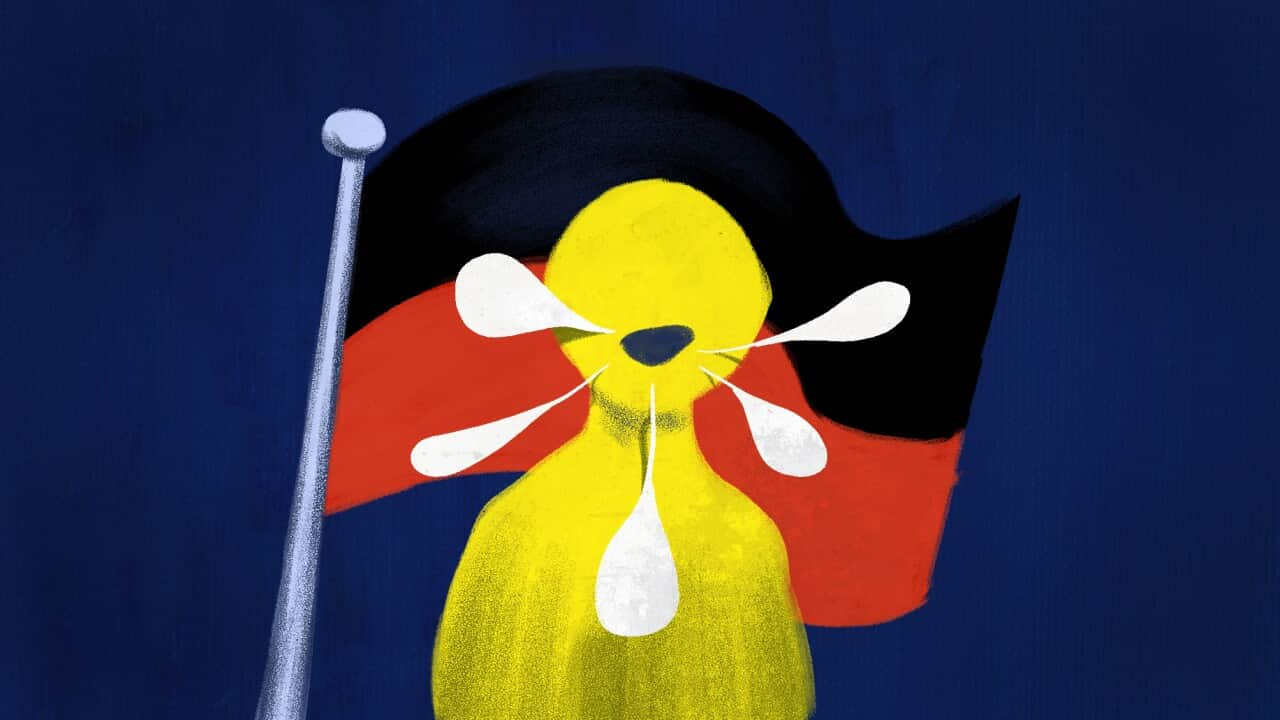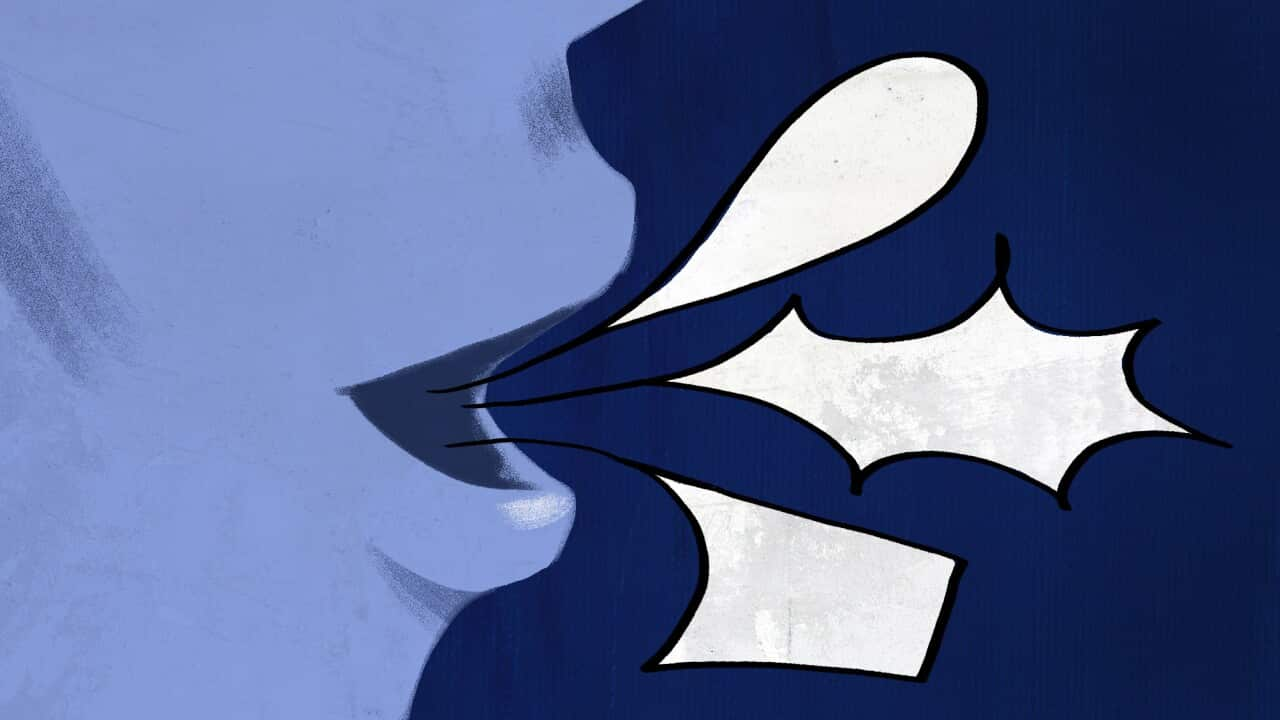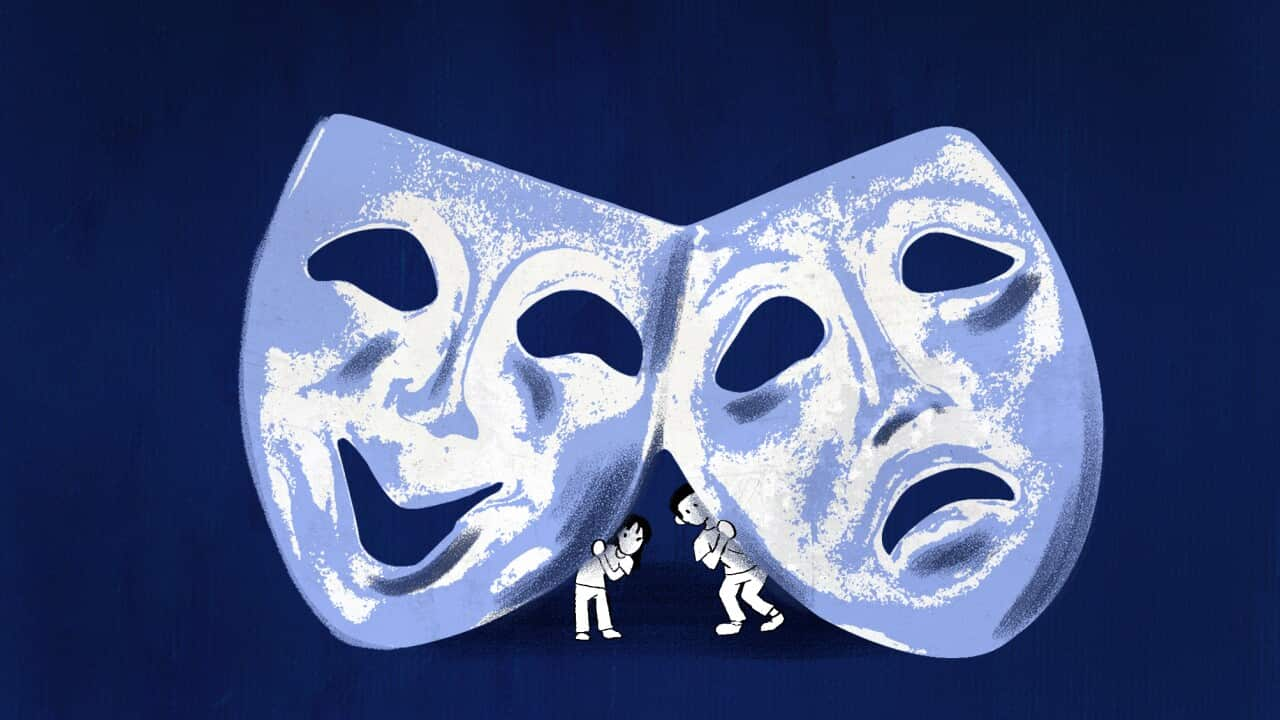TRANSCRIPT
Identity can mean different things to different people.
When it comes to languages, they can help provide people with a connection to culture, deepen one's values and help make sense of history and place.
I'm Hannah Kwon and this is 'Who We Are', a special podcast series where we take a closer look at what identity means in Australia today.
In this episode, we're discussing Indigenous language reclamation in Australia, exploring its history, loss, funding and revival.
We'll explore the unique discovery made by a linguistics professor that helped pave the way for the revival of the Barngarla language in South Australia.
And meet the man who lost everything, but through finding his heritage language, regained a new perspective on life.
When Geoff Anderson suffered a horrific accident at his job as a greenskeeper, he fell into a deep depression.
“Absolutely loved the job. I adored the job. I took so much pride in my greens, it wasn't funny. But in 1998, you sit on the side, wanting roller and go up and down, and you roll the greens and a seat cover went underneath the roller and the roller ended up going over the top of me and it's squashed me back.”
He kept working, through his back pain, until it got to a point where he couldn't move his legs properly.
“I went into the doctor's one day because-- I was on workers' comp, and my head just snapped. And next thing I know I was laying on the floor in a fetal position and the doctor's looking over the top of me and he said, 'You are not going back to work ever at that place again.'“
Geoff says the loss of his 25-year long career coupled with the physical pain took a toll on his mental health, leading him to suffer a complete physical and mental breakdown.
“I just had no more mental strength to go through the pain. I couldn't leave my house for about four years. I become agoraphobic. I had panic attacks. I could not do a thing. I become useless. I become worthless. Now, I was doing the work to bring the money in and then all of a sudden I wasn't able to work. I wasn't even able to walk to the mailbox and get the mail because I thought people were actually looking at me. And my wife then started working in schools as a teacher's aide and we had to change roles. And I thought, 'Geez, a bloke can't even keep his wife and family'.”
At this point, Geoff says he began to contemplate suicide.
“There was one night I went and kissed my kids goodbye. Not goodnight, goodbye. My wife was out and I sat down with a copious amount of medication and yeah, I just wanted to end things there. And then after about 20 minutes, something happened, I just vomited them all up. I went, 'Oh, this is really good. So I can't even do that right.'“
Geoff's wife took him to the doctor, trying to help him perform simple tasks, like getting three or so items from the local shops, in an effort to get him out of the house and back into his Central West New South Wales local Parkes community.
Then one day in 2003, he received a knock on the door that would change the course of his life.
“And a Gamileroi lady from Parkes High School, she came up to the house and she said, 'Geoff, I'm not going to test you up.' And she said, 'But Stan Grant Senior is doing a language class over at Forbes.' Forbes is 35 kilometers away. Now, I haven't managed to get past the front door without somebody. And I don't know what happened. And something in the head just yelled out, 'Do it, do it, do it, do it, do it, do it.' So I said, 'Yep, we are going to do it.'“
Learning Wiradjuri set Geoff on a new path.
“You can take all the Prozac you want, you can take all the medications you want, but if your language and your culture is taken away from you from birth and you're trying to work out what it is, you are walking around like a lost soul all your life.”
Geoff says he always knew there had been something missing in his life, and learning language began to fill that void.
“Then Stan taught me the word yindyamarra. Now yindyamarra means respect. But Stan pulled me aside and he taught me the other meanings of yindyamarra. It means respect, but it also means to go slow, to relax your thoughts, to listen to what's around you and do it peacefully. And that, to me, made sense right on that spot. And I started practicing yindyamarra right there and then. And I came home from that class, and Lindy, the wife, looked at me. She said, "How'd you go?" I went, "Great." She said, "You're going back?" I went, "Yep, next week." And a heap of teachers ended up coming over with me and it was just on from there.”
Stan Grant Senior also taught him the song, 'Kookaburra Sits In The Old Gum Tree,' in language which Geoff says became his mantra.
“He taught everybody, but as far as I was concerned he was teaching only me, you know. And it goes... (sings in language).”
One day he found himself singing it while on a walk with his dog.
“And that language that I was singing built a wall up between me and the whole rest of the world. There was no more-- The world wasn't coming in to attack me. I had this barrier. And when you have a mental breakdown, that's the problem, you have no barrier. It's as if you've put a bucket of water into a pool and you've filled it up and the pool keeps trying to fill it up. And that's what a metal breakdown does inside your head. That's the best way I can explain it.”
In the years that followed, Geoff went from being a student, to what he describes as a reluctant teacher, to eventually taking on a huge role of educating students of all ages and councilors in his community.
Geoff isn't alone in his experiences.
Ghilad Zuckermann is an expert in linguistics and has been working in the field of language revival for 30 odd years.
Professor Zuckermann says he's met many people, including Geoff, who through the discovery of their heritage language stopped being suicidal.
“There was research in Canada in 2007 that proved that there was a correlation between language loss and youth suicide. This was in British Columbia. But what I discovered is that there is also a correlation between language revival and the diminishing of suicidal ideation. In other words, it does not only go one way, you kill a language, you cause suicide, but also it goes the other way. You revive a language and then you improve the wellbeing, the mental health.”
When Professor Zuckermann arrived in Australia in 2004, he says there were around 400 Aboriginal languages but only 12 of them alive and kicking.
In other words, 97 per cent of Indigenous languages in Australia had been killed.
“And what my research discovered is that it's not only ethically the right thing to do, to reclaim languages that have been killed by colonisation, by Stolen Generations; it's not only the aesthetic thing to do, you know, it's beautiful to have a diversity in the world with many people speaking different languages; social cohesion is not from the monolingual mindset. This is kind of a fallacy of many modern people. They say, "Oh, everybody will speak the same language and then we'll have no walls. Have these people forgot to Google Rwanda 1994 or Syria 2019. I mean, people spoke the very same dialect and killed each other. So what I'm saying is that there is the ethical, the aesthetic reason, but most importantly from the perspective of the public servant, the utilitarian reason. So I've noticed the more I revive languages, that people showed feelings of empowerment, of improving their mental health.”
A unique discovery led Professor Zuckermann to become involved in the revival of the Barngarla language in South Australia.
“In 2011, I asked five Barngarla leaders to come to my office at the University of Adelaide. And I told them I discovered a dictionary from 1844 written by a German Lutheran missionary called Claymore Schürmann. And I told them that I know that your language had been killed 50 years ago, and if you're interested, we can reclaim it. And they told me, we've been waiting for you for 50 years. So that was the beginning of the Barngarla language reclamation.”
Emmalene Richards is a 49-year-old Barngala woman based in Port Lincoln, South Australia.
She says getting the opportunity to revive the language, through Professor Zuckermann's discovery, was a big turning point for her.
“When we got this opportunity, it was a big turning point for us here in the Port Lincoln area as Barngarla people, and as somebody that's descended from the Barngarla people, I've always spoken as much as I could, to try to get people to understand the importance of local cultural heritage and language and the content, and how important it is to not only the Barngarla people, but to the wider community, to understand how important it is to get a better appreciation of the heritage culture and the language, how beautiful the language is.”
She says as a child it was disheartening to see her heritage language, history and culture not supported in the school curriculum.
“You feel very distressed, you feel quite disheartened and depressed, that this language of the country that you live on, your own cultural language, is not available for you to learn... And it was just treated like, I suppose a licorice all-sorts melting pot, where any Aboriginal language is okay to use and share anywhere. Which is quite offensive.”
Emma acknowledges there are limitations to documenting the language as the way the German minister interpreted some of the pronunciations in his text are somewhat different to actuality.
But through collaboration with community leaders and linguists like Professor Zuckermann, they've developed language several resources.
“As a result of that partnership, working with Ghil'ad, we have a online Barngarla language app that we've had for a number of years now, which has provided as a really important resource for young and old and all in between, as well as the community right across our country, that can access the Barngarla language app, and at any time look up any words and hear how they are pronounced.”
Professor Zuckermann says it's great to see language revival and funding becoming more mainstream.
“When I started, you could count the tribes in Australia that conducted language revival, whereas now it's like everybody's applying for funds. Eventually, I believe that many linguistics departments will be replaced by revivalistic departments because language revival has to do not only with the arts, but also with health.”
Emma says it's been a real journey for Aboriginal people to get this funding and recognition for their languages.
But she also says funding for the sake of funding isn't great either.
“Because the last thing you want is people to just apply for funding because funding's available, and also to teach the language the wrong way. That's quite upsetting and offensive as well. So, really happy that it's happening across Australia, but definitely hoping that these funding bodies that provide funding for languages, make sure that the rightful process has been done and that there's proven evidence... Because it can cut out the people whose language it is.”
Earlier this year, Aboriginal Elders from Alice Springs delivered a report to Canberra calling for major reforms in First Nations education.
The MK Turner report recommends Indigenous students be taught in language, and a national network of First Nations Language and Literacy Centres be set up.
William Tilmouth, from the organisation Childrens Ground, is part of the delegation.
“We are asking for systemic change, we're asking for structural change, and hopefully that change can be afforded us and we can then it be led by our people; it's Aboriginal knowledge, its Aboriginal education in Aboriginal hands.”
Emmalene Richards says she sees immense value in teaching Indigenous students in language.
“My oldest-- my youngest daughter, sorry, is 13 this year, and when we first started this journey she was about two years old, between one and two, and she now can stand in front of a community or an event, and she does a presentation and the Welcome To Country and speaks the Barngarla language. So, that's just an example of how important and how proud our community is of our Barngarla language here in Port Lincoln.”
And as for Geoff, he says being taught language by Stan Grant Senior has opened up many doors.
“He saved my life you know. And I've told him many times, and he knows the story... He's so proud that he's been able to help me. And then I'm so proud that I've been able to help myself and get out of the house and go and teach people and teach students.”
From not being able to leave the house, to teaching students at the local kindy 'Head, shoulders, knees and toes' in language, Geoff is now on the managing committee of national peak body, First Languages Australia, with delegates in every state.
“I do a lot of work behind the scenes language-wise, not only for First Languages, but locally... We were one of the first ones to actually make a Facebook language group up and a lot of people followed... And it's just incredible to be able to go to trips away and sit there and see the language talking and just hear language talking. It's just phenomenal.”
If you or someone you know needs support, call Beyond Blue on 1300 224 636 or call Lifeline on 13 11 14.
Embrace Multicultural Mental Health supports people from culturally and linguistically diverse backgrounds.
Aboriginal and Torres Strait Islander listeners seeking support can also contact Lifeline crisis support on 13 11 14, visit lifeline.org.au, or call 13YARN (13 92 76) . Resources for young Aboriginal and Torres Strait Islanders can be found at Headspace: Yarn Safe.













